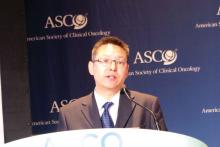CHICAGO – CARs just keep getting better: In an early clinical trial, a chimeric antigen receptor (CAR) T-cell construct targeting B-cell maturation protein induced clinical remissions in 33 of 35 patients with relapsed/refractory multiple myeloma who were treated in an early clinical trial.
“In our current trials we have observed revolutionary, quick, and durable remissions in patients with multiple myeloma,” said Wanhong Zhao, MD, of the Second Affiliated Hospital of Xi’an (China) Jiaotong University.
He presented early results from a single-arm trial of the CAR T cell, labeled LCAR-B38M, in 35 patients at a briefing at the American Society of Clinical Oncology (ASCO) annual meeting.“I think what you’re seeing here is the expansion of immunotherapy to cancers that really are refractory to chemotherapy and how immunotherapy is now providing hope to a lot of patients with cancers that were not really responding to our standard chemotherapies,” commented ASCO expert Michael S. Sabel, MD, of the University of Michigan, Ann Arbor. “What I also think is really fascinating about this and similar forms of research is that you are now seeing the merger of immunotherapy with personalized medicine.”
Current CAR T-cell technologies targeting CD19 or a similar antigen have shown efficacy against acute lymphoblastic leukemia and some forms of lymphoma, but it has been difficult to identify a suitable target in multiple myeloma.
B-cell maturation antigen (BCMA) was first described in myeloma in 2004 as a mechanism for the growth and survival of malignant plasma cells.
Several research groups are currently investigating CAR T cells or monoclonal antibodies targeted to BCMA.
In the study by Dr. Zhao and his colleagues, 19 patients had been followed for more than 4 months before the data cutoff in January 2017. Four months is the minimum established by the International Myeloma Working Group for efficacy assessment.
Of the 19 patients, 14 had achieved a stringent complete response (sCR), 4 had very good partial responses, and 1 had a partial response, for an objective response rate of 100%.
No patients who achieved an sCR have had relapses, and all five patients who have been in follow-up for more than a year have maintained their sCRs and are free of minimal residual disease, Dr. Zhao reported.
One patient with a very good partial response had disease progression, with recurrence of an extramedullary lesion that had previously disappeared.
The most common adverse event was cytokine release syndrome, which occurred in 85% of patients, but the condition was transient and manageable in a majority, Dr. Zhao said.
Two patients developed grade 3 cytokine release syndrome and were treated with tocilizumab (Actemra).
The investigators plan to enroll a total of 100 patients from participating hospitals in China and are planning a U.S. trial for launch in early 2018.
The investigators hope to look at BCMA CAR-T cell therapy in the frontline for patients with newly diagnosed multiple myeloma.
The study was funded by Legend Biotech. Coauthor Fran (Xiaohu) Fan, MD, PhD, is employed by the company. Dr. Zhao did not report disclosures. Dr. Sabel had no disclosures relevant to the study.

